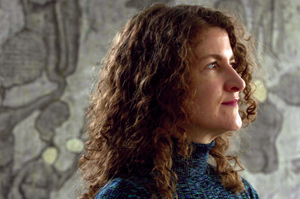|
||
      |
Peer Review ::
The rhetoric of boredom
Emory social historian Elizabeth Goodstein digs deep into the doldrums.

Goodstein tackles the evolution of ennui in her award-winning book Experience
Without Qualities.
To Elizabeth Goodstein, AB’84, boredom is anything but dull. Last November her book on the subject—Experience Without Qualities: Boredom and Modernity (Stanford University Press, 2005)—won the Modern Language Association Prize for a First Book.
“What I’m interested in is how the language of reflection on subjective experience changes over time,” says Goodstein, who earned a PhD in rhetoric from the University of California, Berkeley, in 1996. An associate professor at Emory University’s Graduate Institute of the Liberal Arts, she first tackled boredom some 15 years ago, when a friend suggested the topic as a way to unify her interests in history, literature, philosophy, and sociology. “Boredom is a place where all those issues converge,” Goodstein explains. “It’s not what is boredom, but why do we describe our experience that way? How do we think about ourselves?”
There are two current camps in thinking about boredom: those who believe it represents “a universal feature of the human condition” and those who call for a degree of historical specificity. Examining the works of poets and philosophers such as Charles Baudelaire, Gustave Flaubert, Robert Musil, and Georg Simmel, Goodstein argues, “It’s possible to approach the discourse on boredom in a way that brings both of those perspectives together.” What’s altered over time, she says, is how we discuss boredom, or “subjective malaise,” as she also calls it.
Experience Without Qualities presents boredom’s literary evolution, describing how the word suddenly appeared in the mid-19th century Oxford English Dictionary, sans source of derivation. Elsewhere in Europe, words used to describe discontent began to grow more similar. For example, Goodstein says, the strictly existential ennui of Baudelaire’s France began to carry the more quotidian connotations of the German langeweile—and vice versa.
“What you see is a new way of talking about subjective experience taking form,” Goodstein says. “And boredom is at the heart of that.” While the contemporary term contains elements of the language formerly used to describe it—from the ancients’ melancholic sense of love lost to the first Christians’ faith-questioning acedia—today it represents an intrinsically modern concept.
“Boredom has to do with a kind of distance from the world that you live in,” Goodstein says. “Alienation, estrangement—these are such a basic part of what it means to live in the modern world.” This isolation, she believes, stems from “a loss of traditional modes of thinking and feeling and doing things.” That’s why, she adds, boredom is “so important in the 19th century,” an era marked by social and technological change.
During that time, boredom became a way for the educated elite to confirm its intellectual status. “There are moments when, faced with our lack of success, I wonder whether we are failures, proud but impotent,” wrote mid-19th-century critics Edmond and Jules de Goncourt. “One thing reassures me as to our value: the boredom that afflicts us.” Yet by century’s end, as more people shared the feeling, “boredom had already become a cliché,” says Goodstein, losing the poignant air of discontent expressed earlier.
Contemporary society, she argues, “produces structures of boredom.” Lessons taught in school—such as waiting in line—are prime examples of this “democratization of boredom,” she says. No longer is it limited to the high class. What Goodstein finds striking is boredom’s early onset. “Children in Western society—certainly in American society—learn to talk about their experience that way.”
As evidence of this democratization, Goodstein offers observations from interviewing acquaintances: they spoke nonchalantly of boredom as a universal feature of the human condition—compared with the brothers Goncourt, who saw it as an intellectual quandary. Boredom’s evolution from existential specter to mundane status quo puzzles Goodstein. “How can a language of reflection take root so quickly,” she asks, “and lose its power so quickly?”
The unfolding of ideas and the rhetoric used to express them is also at the root of Goodstein’s current project, Georg Simmel and the Phenomenology of Culture (forthcoming). Simmel (1858–1918) wrote widely on gender, ethics, and even fashion. His pioneering and eclectic works, Goodstein says, rank him among the founders of modern sociology—and meant he was often overlooked by his contemporaries. “I know that I shall die without intellectual heirs, and that is as it should be,” Simmel once wrote. Goodstein hopes to prove him wrong, saying she’d like to “put him on the intellectual map.” She is also working on History in Repose, an examination of contemporary Germany’s culture of identity and memory, focusing on post-1989 changes made to memorial sites at former concentration camps.
Although she has left the study of boredom behind, Goodstein believes a central question remains. When old vocabularies go out of vogue and concepts change over time, “how do we talk about subjective experience?” Other scholars, she reports, are taking up the inquiry: “Just last week I received e-mails from people working on boredom in anthropological contexts.”
This document was updated 7/1/06 and differs slightly from the print version.—Ed.